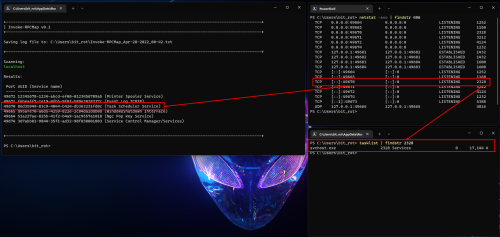Invoke-RPCMap
Invoke-RPCMap can be used to enumerate local and remote RPC services/ports via the RPC Endpoint Mapper service.
This information can useful during an investigation where a connection to a remote port is known, but the service is running under a generic process like svchost.exe.
This script will do the following:
- Create a local log file
- Connect to the RPC Endpoint Mapper service and retreive a list of ports/uuids
- Compare the returned uuids to the list in the script to identify the service name
- Print the results
- Map the next host if multiple hosts are provided
- Open the log file (optional)
You can find the script on my Github here:
https://github.com/robwillisinfo/Invoke-RPCMap
The core of this script was sourced from the following script: https://devblogs.microsoft.com/scripting/testing-rpc-ports-with-powershell-and-yes-its-as-much-fun-as-it-sounds/
Examples
Basic usage (will scan local host):
C:\PS> PowerShell.exe -ExecutionPolicy Bypass .\Invoke-RPCMap.ps1
Add -targetHosts or -t (alias) to scan multiple hosts:
C:\PS> PowerShell.exe -ExecutionPolicy Bypass .\Invoke-RPCMap.ps1 -t localhost,host1,192.168.1.50
C:\PS> PowerShell.exe -ExecutionPolicy Bypass .\Invoke-RPCMap.ps1 -targetHosts localhost,host1,192.168.1.50
Add -openLog or -o (alias) to open the log file in notepad when the script has completed:
C:\PS> PowerShell.exe -ExecutionPolicy Bypass .\Invoke-RPCMap.ps1 -t localhost,host1,192.168.1.50 -o
C:\PS> PowerShell.exe -ExecutionPolicy Bypass .\Invoke-RPCMap.ps1 -t localhost,host1,192.168.1.50 -openLog
